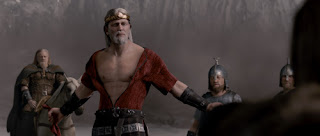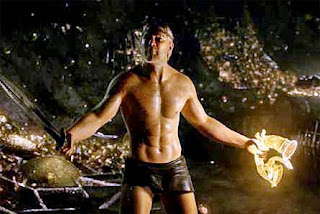 I've always enjoyed the work of Robert Zemeckis (especially Contact, Death Becomes Her and the Back to the Future Trilogy). He's not Spielberg, but he's not trying to be either. Like Spielberg (or more accurately Cameron and Lucas) however, technology fascinates Zemeckis and he's always pushing the boundaries. Since the days of Who Framed Roger Rabbit, Zemeckis has been developing tools to expand his ability to create worlds for his characters to inhabit. I never get the sense that he's incorporating all this technology just because he can; it's almost always integral to the story.
I've always enjoyed the work of Robert Zemeckis (especially Contact, Death Becomes Her and the Back to the Future Trilogy). He's not Spielberg, but he's not trying to be either. Like Spielberg (or more accurately Cameron and Lucas) however, technology fascinates Zemeckis and he's always pushing the boundaries. Since the days of Who Framed Roger Rabbit, Zemeckis has been developing tools to expand his ability to create worlds for his characters to inhabit. I never get the sense that he's incorporating all this technology just because he can; it's almost always integral to the story. Beowulf with respect to technology, picks up where The Polar Express left off. I never saw the latter, but I remember how eery the characters looked. The conductor modeled after Tom Hanks looked a bit frightening because of how glassy and lifeless his eyes appeared. There is a psychological-effect that arises from observing a creature that looks more human than not. As the mimicry approaches perfection, the more troubling the doppleganger appears to the viewer. Maybe they remind us of dead bodies; I'm not sure, but I know it freaks people the hell out. Beowulf doesn't suffer from this problem to quite the degree that The Polar Express does. For the most part, I marveled at how photo-realistic the CG characters were. Anthony Hopkins' King Hrothgar impressed me the most. It seemed to capture the essence of Anthony Hopkins completely and if you just happened to glance at the screen for a few seconds, you might actually mistake the animated character for the flesh and blood person. The technology is that good (with the exception of the Robin Penn avatar who looks a little too soft and less detailed).
Ray Winstone's Beowulf is an achievement, but for all of us who remember Ray Winstone in this:
It's not just a little bit hilarious to see him portrayed like this:

Okay, so enough about how cool the movie looks. Neil Gaiman and Roger Avary have taken a much hallowed mythopoeic text and created a worthy interpretation not merely accessible to modern audiences, but relevant as well. (I don't mean relevant to the Iraq War or current credit-implosion driven economic woe, but "relevant" as in relevant to modern schools of thought and sensibilities.) The movie is a deconstruction (in the popular sense, not the way-above-my-head Derrida sense) of hero-worship and looks at a crucial moment in history where humanity underwent a paradigm shift in how we create/worship our deities. The importance of stories is stressed throughout the film. In the world Beowulf inhabits, the story defines the man. He is literally nothing without it. Our early introduction to Beowulf reveals him to be somewhat of an embellisher; as a narrarator he's unreliable. He's a braggart, but this isn't a necessarily negative quality in his world. He's the type of guy who might have killed a giant, but in the re-telling speaks about how he killed five, with his bare hands, naked, while shaking off a hangover. Either way, he's no coward and his actions speak just slightly less loud than his words.
The other theme that arises in the movie is how Jesus Christ came to supplant not only the old Nordic gods (Tyr,Odin, Thor, etc.--shoutout to the Norse gods for giving us the days of the week!), but the for-all-intents-and-purposes human gods such as Beowulf. Prior to Christ, in order to achieve immortality (which when you think about it is the baseline definition of a god) a man needed his name to live on in story, song, etc.; he needed some way to have his identity forever entwined in the collective human consciousness. The advent of Jesus meant that anybody could become immortal. All they had to do was accept Christ. Beowulf laments this development, stating with a measure of moroseness in his voice something akin to, "Back in my day, you had to earn it, guldarnit!" Not bad for what most people will dismiss as a 90 minute overly violent cartoon.
Gaiman has plumbed these depths before with the seminal Sandman series and in his novel American Gods. He's perhaps the best post-modern storyteller we have today. If I had my druthers, I'd teach Sandman in a college lit course. Yes, it's that good. And that's all I've got to say about that for now.
Go check it out. Preferably in IMAX 3-D. You live in a terrible and wonderful age.



